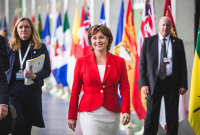Support strong Canadian climate journalism for 2025
With the British Columbia provincial election looming, Insights West took a detailed look at the way British Columbian voters feel about politics in general, their perceived influence in decision-making, and the way they relate to their elected representatives. Across the province, seven-in-ten British Columbian voters (70 per cent) claim that their ballot makes a difference in provincial elections. Voters in the middle income bracket are more likely to think their ballot actually matters (79 per cent) than those in the lowest and highest brackets (62 per cent and 66 per cent respectively).
Most voters in British Columbia (71 per cent) admit that they began to discuss politics when they were growing up, with their parents or older siblings. There are some differences in the way we become acquainted with politics, particularly according to ethnicity. Voters of South Asian descent are more likely to chat about politics with family (78 per cent) than those of European (73 per cent) or East Asian (68 per cent) origins.
The province’s South Asian voters are also ahead of all other groups when it comes to discussing politics with friends who are not their classmates at school (81 per cent, compared to 74 per cent for East Asians and 66 per cent for Europeans) and with colleagues at the workplace (78 per cent, compared to 65 per cent for Europeans and 62 per cent for East Asians).
However, when we ask about shaping policy, voters are way behind other entities. Corporations are regarded as the most influential group in provincial issues (91 per cent), followed by lobbyists (86 per cent), unions (77 per cent) and foreign investors (74 per cent).
So, where do voters rank? Only 50 per cent of British Columbians think citizens are influential in shaping policy. Community associations get a similar rating (48 per cent).
It is not a surprise that entities that “technically” cannot cast ballots are regarded by British Columbians as being the ones “calling the shots” when it comes to policy. Research conducted by Insights West in April 2016 for the Dogwood Initiative provided a glimpse of an electorate that is unhappy with current fundraising practices.
When we re-asked some of these questions two years later, residents remain sickened by the status quo. Large majorities of British Columbians support banning donations from corporations (77%) and unions (73%) to political parties or candidates, as well as putting an end to private political fundraisers where people pay thousands of dollars to spend time with elected politicians (75%).
Another key difference lies in the way British Columbian voters relate to their municipal, provincial and federal representatives. Voters give their Mayor an average approval rating of 55 per cent. A majority (52 per cent) also approve of the performance of their Member of Parliament in Ottawa. Yet when asked to rate their own Member of the Legislative Assembly, the rating falls to 45 per cent.
The issue is not British Columbian voters disapproving of politicians in Victoria more than they disapprove of those in Ottawa (34 per cent and 37 per cent respectively). The problem is that 17 per cent of voters—people who have told us that voting is important, who discuss politics, who plan to vote this year and who have voted in the past—are uncertain about what their Member of the Legislative Assembly is doing. The level of undecideds on this question jumps to 27 per cent among voters aged 18-to-34 and 22 per cent among those in the lowest income bracket.
Voters in British Columbia have a low opinion of the influence they wield, especially when pitted against corporations, lobbyists, unions and, yes, even foreign investors. The existing fundraising regulations that British Columbians wholeheartedly disagree with are responsible for the loss of faith in what a citizen—informed, engaged and committed—can achieve. If the rules change, regardless of who forms the next provincial government, it will be interesting to see if British Columbian voters believe that their voice is becoming more powerful. At this point, they are certainly ranking themselves below the well-funded and well-connected.
The results quoted in this article are based on an online study conducted by Insights West from April 19 to April 22, 2017, among 802 adult British Columbians. The data has been statistically weighted according to Canadian census figures for age, gender and region. The margin of error—which measures sample variability—is +/- 3.5 percentage points.







Comments
The number of people living paycheque to paycheque with no emergency fund and no retirement savings is increasing in Canada. Not as bad as the U.S. but getting worse due to many factors but the real estate speculation is part of it. One U.S. investment firm calls this income divide the protected (the wealthy or those with secure high paying union jobs with defined benefits pension plans) versus the unprotected (anyone in the lower 55% strata who haven't seen a real wage increase in 2 decades and whose work is precarious. The elite of the protected call the shots at the policy level on both the right and the left and are almost oblivious to the plight of the majority. This is creating fertile ground for a populist politician. My hope is that the Greens can garner enough seats to hold the other parties feet to the fire.
Vote NDP to bring equality and affordability to BC.